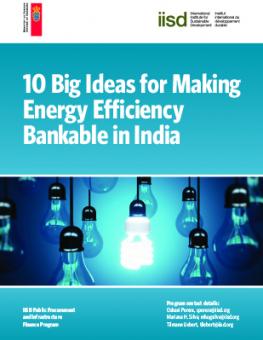
10 Big Ideas for Making Energy Efficiency Bankable in India
In a continent that is starved for energy and infrastructure, it is an enigma that India’s markets for energy efficiency have yet to take off. The authors of the report spent several months researching and debating this issue with stakeholders in India and around the world.
The case for energy efficiency is most certainly well documented. The crux of the problem, however, is that that politicians, policy-makers and financiers have yet to realize that energy efficiency is inexpensive and easily scalable when compared to the development of large-scale power plants. The Indian focus is very much on increasing energy generation rather than avoiding the use of energy in the first place. India needs to value each kilowatt hour (kWh) of energy saved on par with each unit of energy generated. And as such, the first policy choice in the path towards energy security and energy for all must be encouraging industry and consumers to use energy more efficiently. Moreover, decision-makers must realize that if energy is saved where it is easiest—across low-tariff and highly subsidized consumer segments—energy distribution companies (discoms) are able to offer the saved kilowatts (or negawatts) to higher tariff paying consumers.
In short, India’s energy deficit cannot be accomplished without due focus on energy efficiency; to that end, in this document, we present 10 big ideas to make this sector bankable. All of these ideas are practical and implementable in the immediate term. They do not require large executing budgets, but they do require technical expertise, political will and persistent follow up. These ideas are also multi-disciplinary—they provide solutions to prohibitive perceptions of risk in investing and financing energy efficiency, the lack of reliable base lines and poor policy incidence.
Participating experts
You might also be interested in
Green Public Procurement in India
This report analyzes the status of green public procurement (GPP) in India and suggests key strategies for advancing sustainable procurement practices.
A Sustainable Asset Valuation of Non-Motorized Transport in Coimbatore, India
A Sustainable Asset Valuation (SAVi) of the economic, social, and environmental benefits of a non-motorized transport (NMT) network in Coimbatore, India.
Sustainable Asset Valuation (SAVi) of a Public Bicycle Sharing System in Dwarka, New Delhi, India: A focus on the environmental, social and economic impacts of non-motorized transport infrastructure
This SAVi assessment values the environmental, social and economic benefits generated by a public bicycle sharing system. Its results demonstrate how the transport system delivers to sustainable mobility targets in Delhi.
Increased Support Needed to Achieve India's Clean Energy Goals
India is on track to achieve many of its 2030 clean energy goals but needs to step up government support measures to accelerate the deployment of offshore wind, electric vehicles, and green hydrogen, according to a new report.